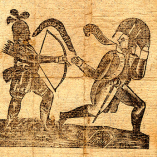
Adolf Hitler inspects Paris, 1940. Photograph by Heinrich Hoffmann. The New York Public Library, The Miriam and Ira D. Wallach Division of Art, Prints and Photographs.
On this episode of The World in Time, Lewis H. Lapham speaks with historian Peter Fritzsche about his new book Hitler’s First Hundred Days: When Germans Embraced the Third Reich. They discuss just how short a hundred days is when you think about how much the world changed during that brief span of weeks. “In just one hundred days, political actors rediscovered the power of collective action; the marching in 1933 would lead to war in 1939,” Fritzsche writes near the beginning of his book. “The new regime was born of coercion—but also of consent, even though the line between these two was as difficult to discern then as it is today. The story of Hitler’s first hundred days is about deferral and irresolution; no one knew for certain the depth of conversion, or the extent of mere appearance, or the effect of terror. The legitimacy of the Third Reich rested on a potent combination of genuine enthusiasm and doubt, the fact that no one quite knew who was a true Nazi believer and who was not.”
Lewis H. Lapham speaks with Peter Fritzsche, author of Hitler’s First Hundred Days: When Germans Embraced the Third Reich.
Thanks to our generous donors. Lead support for this podcast has been provided by Elizabeth “Lisette” Prince. Additional support was provided by James J. “Jimmy” Coleman Jr.






